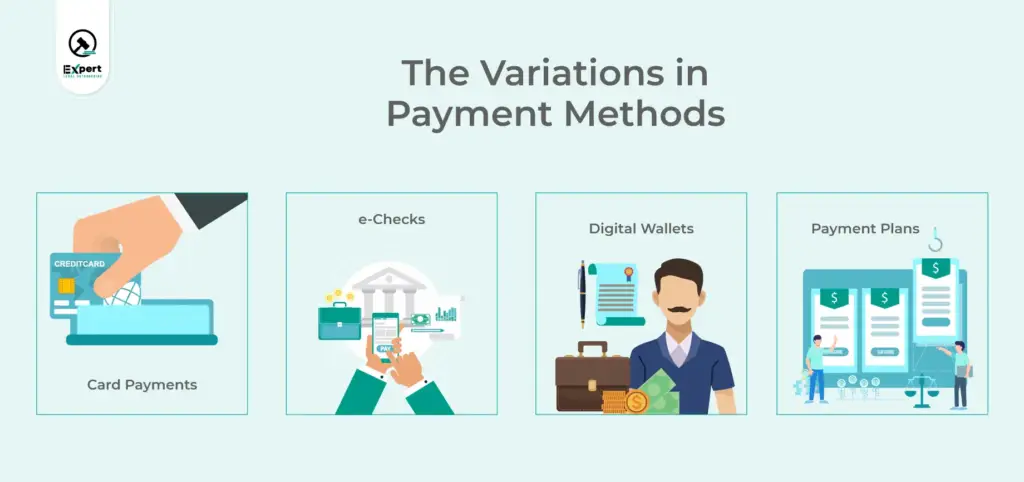Stop stressing over how to pay attorney fees—it’s easier than you think!
Regardless of how easy or difficult the case is, there’s a payment option to match your needs. From contingency fees and legal aid to credit cards and payment plans, attorneys today even offer streamlined law firm payment processing systems to make transactions easier for clients.
Let’s dive in and explore everything you need to know about managing attorney fees and finding the best payment solution for your situation.
How to Pay Attorney Fees

Credit and Debit Card Payments
Paying legal fees with a credit or debit card is a simple and convenient option that many law firms now offer.
| For Clients | For Law Firms |
| It’s a familiar method for most clients, making the process feel effortless and straightforward. | Accepting card payments means getting paid faster, which helps maintain steady cash flow. |
| It’s quick and secure, with the added flexibility of paying in installments if needed. | This method integrates smoothly with legal time tracking software and other tools, streamlining payment tracking. |
| Ensures compliance with law firm billing guidelines. |
ACH Payments (eChecks)
ACH (Automated Clearing House) payments, also known as electronic checks, allow clients to pay directly from their bank accounts.
Advantages for Clients:
- No interest charges, unlike credit cards.
- A straightforward option for clients who prefer digital alternatives to writing physical checks.
Considerations for Firms:
ACH payments typically come with lower processing fees compared to credit cards. Using a legal-specific payment processor ensures compliance with ethical standards and aligns with invoice management for mid-sized legal firms, providing a cost-effective solution.
PayPal and Other Digital Wallets
Clients: PayPal is a popular choice, especially for younger, tech-savvy clients. It’s easy to use and allows for quick, seamless transactions from mobile devices or online platforms. It’s a simple and fast way to complete transactions without needing to write checks or deal with bank transfers.
For Law Firms: Accepting digital wallets like PayPal expands options for legal payment methods. This approach also supports modern legal spend management software, enabling firms to efficiently track and manage digital wallet transactions. However, law firms must be mindful of ethical considerations, particularly when handling retainer and trust account payments. Despite higher transaction fees, this flexibility contributes to a law firm billing revolution by attracting a broader, more diverse client base.
Retainer Fee Payments
A retainer fee is often required upfront to secure a lawyer’s services. It’s a way for clients to ensure that the attorney will be available and dedicated to handling their case.
Types of Retainer Agreements:
- Non-Refundable Retainers: This type of fees guarantees the lawyer’s availability but it may not cover all case-related fees.
- Advance Payment Retainers: Act as a deposit, with legal fees deducted as the case progresses. If the case takes longer or involves more work, additional payments may be required.
Here is the content in a table format that you can copy:
| For Clients | For Firms |
| Provides clients peace of mind that the attorney will prioritize their case and be available when needed. | Helps ensure consistent cash flow and commitment from clients. This provides a financial cushion to cover initial costs. |
| The client knows the lawyer is committed to their matter and will start working on it right away. | Helps the firm manage its workload more effectively and strengthens the relationship between the lawyer and the client. |
Payment Plans
For clients facing financial challenges, many law firms offer customized payment plans to make services more accessible.
Here is the content in a table format that you can copy:
| For Clients | Advantages for Firms |
| Payment plans divide a large bill into smaller, manageable payments, reducing the financial burden. | Offering payment plans reduces the risk of unpaid invoices and ensures a more predictable cash flow. |
| This flexibility allows clients to get the legal help they need without paying everything upfront. | Legal firm billing software can automate payments, making the process seamless and reducing administrative tasks. |
Overall, payment plans benefit both clients and firms, ensuring affordable legal services and steady payments.
Choosing the Right Payment Option for Your Case
Hourly Rates
This is a common method that attorneys use to bill for their services. You are charged for the actual time they dedicate to your case, typically recorded in increments of 15 or 30 minutes. The hourly rate can vary based on factors such as the lawyer’s level of experience, the complexity of your case, and their geographical location.
For instance, a seasoned attorney in a major city may have higher fees compared to a less experienced lawyer in a smaller community. Although these higher rates might seem steep, you are essentially paying for their expertise and skills, which can often result in faster and more effective outcomes. If you have concerns about the costs, it’s a good idea to request a detailed account of how the time was utilized.
Flat Fees
Flat fees are Fixed. You and the lawyer agree on a fixed price for the service, regardless of how long it takes. This option is typically preferred for simple tasks such as drafting a will or managing an uncontested divorce.
The best part about flat fees is their predictability—no unexpected bills! Just ensure you understand what’s included to avoid any surprise charges if the situation becomes more complex than anticipated.
Retainer Fees
A retainer functions like an advance payment to secure the lawyer’s services. It’s commonly used for ongoing or long-term cases, such as corporate legal advice or family law issues. Think of it as reserving their time to address your legal needs.
In some cases, the retainer may be non-refundable, but often, the lawyer will deduct from it as they work on your case. They typically provide updates on how the funds are being utilized, allowing you to monitor the expenses.
Contingency Fees
This arrangement is a “you win, they get paid” scenario, frequently seen in personal injury or workers’ compensation cases. Instead of paying upfront, the lawyer receives a percentage of the amount you win, whether from a settlement or a court ruling.
For instance, if you win $50,000 and the lawyer’s fee is 30%, they would take $15,000. If you lose, you don’t owe them anything, but you may still need to pay some basic expenses like court filing fees. This option is particularly beneficial if you can’t afford to pay upfront but wish to seek justice.
The Diversity of Attorney Fees
Case Complexity
Case fees fluctuate depending on the complexity of the case.
For instance, a lengthy business lawsuit is likely to cost more as it will requires more time and expertise. For such cases, clients might also need advice on how to take legal action for non-payment of invoices if disputes arise with payments or settlements.
While cases such as reviewing a contract will cost less as it won’t take as much time or effort.
Location and Expertise
Urban versus Rural is a real thing. Lawyers from big cities charge more than those from comparatively small cities. This is because the cost of living is higher and demand for their services is greater.
Similarly, niche legal expertise, such as property law or intellectual property, typically commands higher fees. This can be particularly true for attorneys handling sensitive matters, where services like payment processing attorneys ensure a seamless experience for their clients.
Firm Reputation
Reputation is a factor too. An attorney from a well-reputed firm with proven track record will charge more for their services. Bit keep in mind, the investment could be worth it if your case has high-stakes or complex.
A well-known firm brings experience and confidence which does make a difference in the outcome of your case. They may also provide flexible payment plans to help clients navigate financial obligations, such as how to pay court-ordered attorney fees effectively and without added stress.
Can You Pay Attorney Fees With No Money?
Yes, there are resources to help you pay for attorney fees with no money. For instance:
- American Bar Association: They provide a list of budget-friendly legal services and nonprofit law firms by state.
- Legal Services Corporation (LSC): An independent nonprofit that provides financial support to low-income Americans.
Fundraiser: You can start a fundraiser to help you pay for a lawyer.
Contingency Fee Arrangements
Let’s say you got injured in a car accident due to the driver’s negligence. You, then, are not required to pay for the legal representation as the lawyer will take a cut from the settlement amount once you win the case.
It also works well in employment related disputes as well. As a result of not having initial payments out of pocket, the clients have far less risk. If the law firm doesn’t close cash compensation for you, the only thing they have in claim is a ‘thank you’ from you; He has to lose on any payment you deserve to win.
Legal Aid and Pro Bono Services
Training lawyers – law students are encouraged by legal aid organizations to offer their service for free or at a reduced rate to those who are least able to afford them.
Programs do exist and are aimed at targeting housing or family law services to low-income individuals but do only focus on an income and case type. Such critical services are beneficial for the low-income class needing sort of legal services.
Crowdfunding for Legal Fees
A new innovative method consists of online crowdfunding services like gofundme in order to appeal to the wider audience who are willing to help.
By appealing the masses, lawyers can get a substantial amount from the general public, which is effective when dealing with high profile cases. It assists not only with paying legal fees but also with other components associated with legal conflicts.
Other Factors to Take Into Account When Paying Attorney Fees
Additional Costs
So, its true that attorney fees are not the only cost you will face. There are additional costs such as court filing fees, expert witnesses, or document preparation. These extra costs pile up quickly, so it is crucial that you ask your lawyer for a detailed breakdown of expenses before moving forward.
Are Attorney Fees Refundable if You Lose Your Case?
This all depends on the agreement you have with your lawyer. Retainer fees are often non-refundable, but unused funds in some cases might be returned. With contingency fees, you don’t pay if you lose, but you could still owe costs like filing fees or expert witness expenses.
Can Insurance Help Pay Your Attorney Fees?
Only in some cases. Legal insurance policies might help with things like employment disputes and health insurance works out if your legal issue is tied to a medical matter. Ass you service provider to see what’s covered.
What to Expect from a Free Consultation with an Attorney
A free consultation allows you to talk to an attorney about your case and have your case evaluated without incurring any initial costs. You will explain your legal issue during this meeting, and the lawyer will present you with some brief ideas on how he or she will help you.
Expect the attorney to provide an upfront explanation of his or her fees and billing methods, to help you understand how he or she charges for services rendered. This includes any type of fee or costing arrangement such as hourly rates, flat fees, retainers, etc.
Do not be shy while asking questions regarding costs and payment as this is the right time for you to do so. Ask:
- What is the price structure for the attorney?
- Are there any additional or hidden fees that I should know about?
- Can I set up a payment plan or negotiate the fee?
- Will the attorney offer a flat fee or hourly billing for my case?
Openness about your financial status and inquiry at this stage helps ensure that you know exactly what the consultation will cost and that you won’t be left with surprises later on.
Is It Possible to Negotiate Your Attorney Fees?
Yes, attorney fees can often be negotiated contextually, especially if your case is relatively straightforward or doesn’t require extensive efforts in its success.
Many attorneys welcome negotiation on their rates or gladly offer payment plans that may accommodate your monetary position.
The approaches you may take on the negotiations include:
- Payment plans: If you’re unable to pay the full fee in one payment, ask if the lawyer can agree to allow you to pay in installments on a set schedule.
- Flat fees: When the case is fairly simple, ask whether the attorney would be willing to provide an estimated fee rather than bill on an hourly basis. This way, you will know right there what your budget for the matter is going to be.
- Discounted fees: Depending on how simple or involved the case is, try to negotiate for a lower hourly rate or flat fee.
Being open about your inability to pay in full may actually yield better outcomes during negotiations. The lawyers want to help; many of them wish to help you accommodate legal services within your finances, and as such, many are likely to give discounts or an installment plan.
Just ensure you put everything in writing to avoid later confrontations.
Considering the Type of Legal Matter
The other hinge on which your choice of an attorney leads into the decision surrounding payment is the type of legal matter at hand. Different types of cases are generally billed differently. Hence, it is paramount that you align your payment options with the type of legal work that you want to be undertaken.
- Contingency fee: Commonly used. The lawyer will not get paid unless they win the case or settle with insurers. The payment is usually expressed in terms of a percentage of the final settlement amount or judgment. For this case, the attorney-client relationship will be a good way to go if they don’t have money upfront.
- Hourly rates: They are most common in several types of legal matters. Hourly fees are flexible but can accumulate fast, so be sure to talk about how time is tracked and billed.
- Flat fees: Commonly used for routine legal services. Flat fees provide predictability in pricing and a great option for straightforward tasks.
- Retainer: An advance payment that secures the lawyer’s time and services through a period. This is frequently used in complex or long categories of cases.
There are advantages and disadvantages associated with each structure; therefore, go for one that suits your legal needs and financial friendly. If you are still in doubt, ask the attorney to explain why they are recommending a certain payment option and if any alternatives are available.
Final Thoughts on Paying Attorney Fees

It is vital that you understand your rights when it comes to attorney fees. You have the right to clear explanations of billing methods and fee structures. If you have a financial issues, consider different payment options such as payment plans, legal aid, contingency agreements.
Remember, transparent communication with your attorney is key – discuss fees upfront and ensure transparency throughout the process. This helps avoid surprises and keeps you focused on resolving your legal matter confidently.
There is always a way to make legal representation accessible, so without further delay, consult your attorney and pay your fees without any issue..
FAQs About Paying Attorney Fees
- Can I Pay My Attorney Fees in Installments?
Though paying in installments is by no means universally common; a good number of attorneys, however, offer payment plans.
- What If I Can’t Afford My Attorney’s Fees?
If the truth be told, it is possible to qualify for legal aid, rely on pro bono service or contingency fee arrangements where payment is made only in the event of a win.
- Are Attorney Fees Negotiable?
Yes, attorney fees are negotiable. You may want to ask your lawyer if he/she would be willing to modify such fees or offer a payment plan.
- Is It Legal for Lawyers to Accept Online Payments?
Yes, lawyers can and do accept payment for their services over the Internet. Most lawyers use secured platforms for receiving online payments to their particular intake practice.

Rafia Alam Rowshni delivers a unique combination of legal knowledge and content creation talent using SEO Tools and SERP analysis. She has a solid background in public health and legal services and knows the complexities of the legal world. She can translate complex subjects into simple, concise, and entertaining information that audiences can actually use.




